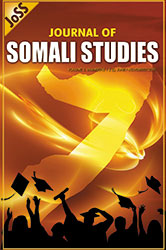
 editor@adonis-abbey.com
editor@adonis-abbey.com ![]() UK: 0207 795 8187 / Nigeria:+234 705 807 8841
UK: 0207 795 8187 / Nigeria:+234 705 807 8841
JOURNAL OF SOMALI STUDIES Volume 3, (Numbers 1 & 2), June/November 2016
Table of Contents :
From Linguistic Imperialism to Language Domination: “Linguicism” and Ethno-Linguistic Politics in Somalia
Mohamed A. Eno, Omar A. Eno & Abderrazak Dammak 9
As was the case with many newly independent African nations, Somalia was beset by a language problem whose complexity had begun well before independence and the unification of British Somaliland and Italian Somaliland in 1960. With three languages (English, Arabic, and Italian) used as media of communication in government offices and in schools, various Somali administrations struggled to contain the impasse but found no tangible solution. Barely three years after Mohamed Siad Barre seized power in October 1969, he had his military regime introduce the Somali orthography in the Latin alphabet. Based on this milestone, Siad Barre’s military rule is highly commended for taking a remarkable step forward in what came to be known as the Somalization project. However, officials of the government and Somali scholarship failed to examine the social impact of the Somalization project on sections of the multi-ethnic and multilingual entities in the country, in addition to overlooking the possible alternative interpretations that could be drawn from the factors underlying the project. Hence, in this essay, we bring into focus some of the factors related to the adoption and implementation of the national language, particularly in two aspects: (a) the selection of Af Maxaa (Mahaa language) over other vernacular tongues (b) the central/northern variant of Maxaa that was standardized as the national language. In more specific terms, we dwell on how ethnic politics and hegemony were not only longstanding problems in Somalia’s language issue but also significant actors in the military regime’s language decision and how despite the pride that underpinned nationalizing the language of the supposedly homogeneous monolingual nation, aspects of linguicism and cultural prejudice remain visible in Somali studies and scholarship, a likely reason that scholars have been too shy to examine the considerable pitfalls of the process throughout sections of the society.
The Indian Chapter in the Global Somali Diasporic Narratives
Geetha Ganga53
Towards an Academic Praxis of Integrity
Rima Berns-McGown85
Inaugurating Caddaan Studies
Mohamed A. Eno107
Suturing Somali Wounds
Ali Jimale Ahmed119
[abstract]
| Annual Subscription Rate |
| Individual Subscriptions |



